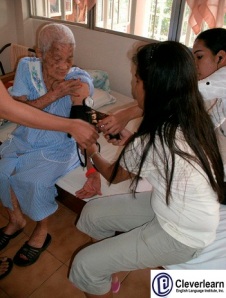The increasing population of elderly people in Japan is alarming. By 2016, an estimated 500,000 caregivers will be needed according to the Ministry of Health, Labor, and Welfare in Japan. The Economic Partnership Agreement (EPA) between Japan and Philippines that was completed in 2006 allows both countries to exchange 12,000 caregivers in the next couple of years. But it seems Japan needs more caregivers than what was being agreed.
Japan needs a huge labor force in the healthcare industry that is not known among the Japanese youth that is why they are now starting to look for possible caregiver candidates in Asia such as Philippines and Indonesia. Philippines has been deploying healthcare workers to this country under this EPA but since Japanese licensure exams become stringent in 2009, only 1 caregiver and 15 nurses have passed. Cultural differences and Japanese language are among the major hindrances for nurses and caregivers to succeed in their application. Furthermore, Japanese language studies are expensive and limited.
In this matter, Filipino women who used to work as hostesses and married to Japanese and are currently residents of this country are being lured to the caregiver industry. These women can speak and understand Japanese well because they have mostly lived in this country for more than 20 years and as wives of Japanese men, they already have valid visas. Most of these women are not licensed nurses nor graduates of a certain bachelor’s degree but they have undergone caregiver training course and eventually graduated from Tokyo Caregiver Academy.
 Japanese Embassy reported that there were 237 Filipino nurses and 396 caregivers who have undergone training last May of 2012. According to Philippine Overseas Employment Agency (POEA), there were 400 nurses and caregivers that have been set for interview midweek of September last year. Successful applicants shall leave for Japan by June this year and should undergo another 6 months of paid language training. They can subsequently work in Japanese hospitals and caregiver facilities for 3 to 4 years to help them familiarized with the Japanese healthcare system.
Japanese Embassy reported that there were 237 Filipino nurses and 396 caregivers who have undergone training last May of 2012. According to Philippine Overseas Employment Agency (POEA), there were 400 nurses and caregivers that have been set for interview midweek of September last year. Successful applicants shall leave for Japan by June this year and should undergo another 6 months of paid language training. They can subsequently work in Japanese hospitals and caregiver facilities for 3 to 4 years to help them familiarized with the Japanese healthcare system.
The Japanese government promised to modify their employment scheme to attract more foreign applicants and to improve their licensure exam by incorporating English medical terms and by using simpler Japanese terms to make this exam passable. If applicants fail the licensure exam they can re-take but only within their period of stay. If they still fail after several re-take they must go back to the Philippines and would have to undergo caregiver training again. However, they have the option to stay for an unlimited period in this country to practice their profession if they pass the national licensure examination.
Most elderly Japanese people believed that the Filipino caregivers are better than Japanese caregivers. They would rather be taken cared of by these caregivers than staying alone in their homes. Filipinos are known to excel at taking care of elderly people because of being compassionate and hospitable and they are trained with their communication skills as well. An average monthly salary of Nurses in Japan would range from 66,000 to 113,000Pesos and 64,000 to 95,000Pesos for caregivers.